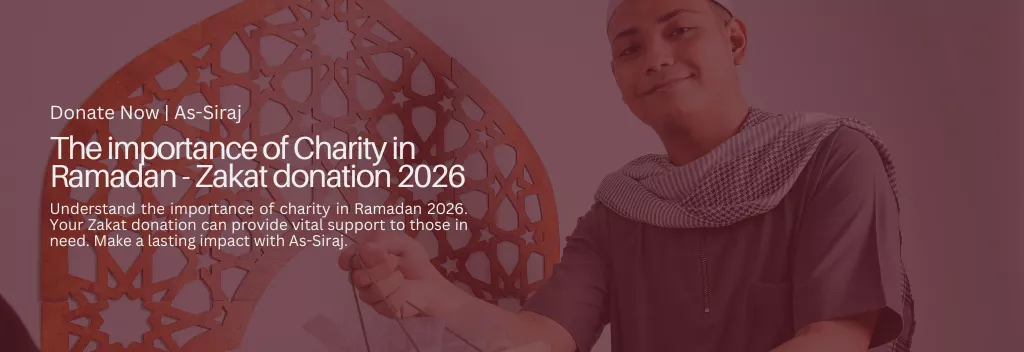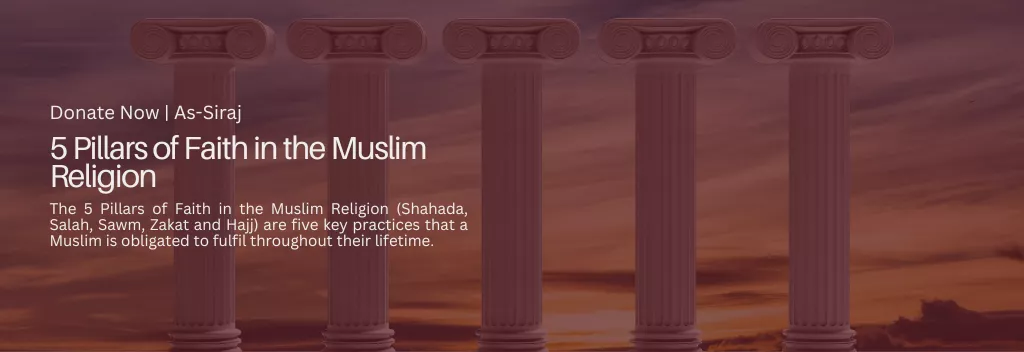Introduction
Through this month of Ramadan, fasting, prayer, and introspection are not the only ones observed but also sharing and giving back to the community are being practiced. The act of paying Zakat is one of the most important pillars of Ramadan. Zakat, a type of charity, is a mandatory gift of the faithful which, if they are suitable, would purify their wealth, deplete the poverty rate, and enhance social welfare.
This piece of writing will make a complete delineation of the subject of Zakat during Ramadan, both in terms of the people who are liable to make the payment and the method of calculation for it, how it is to be paid, etc. Moreover, we will also venture into the subject of Nisab as a limit, the criteria of eligibility as stated in the Quran, which is the significance of charity with a focus on how AS-SIRAJ can help in fulfilling your Zakat duties.
1. What is Zakat?
Zakat, in Islam, is a religious tax which purifies property by making what is left over productive and causes growth in the economy. It can be translated in English as a poor-due that a Muslim has to pay to those who are in need. They usually consist of 2.5% and are levied on the portion of wealth that is above the minimum taxable level of a taxpayer. Zakat has an important role in helping the needy people and enjoys the special favor of Allah; therefore, those who can are encouraged to perform it.
It is also encouraged that Zakat be given through the channels that ensure transparency and traceability and at the same time take advantage of the potential of the best use of the funds. Zakat is given to the needy and it is the purpose of Zakat to clean one’s wealth by sharing a part with those who are less privileged, and thereby, food, clothing, and shelter for everyone will be provided. In doing so, society will be more balanced and just.
Zakat in Ramadan
The follower of Islam typically becomes more open to others and more generous during Ramadan. Giving Zakat on Ramadan is highly suggested since the month of Ramadan is blessed with the highest rewards for the work done on it. Ramadan is the opportunity to improve oneself through the act of giving. It is also the time we help the needy alongside.
2. Who is Eligible for Zakat?
Zakat is one of the Islam’s five pillars. It is an obligation for the Muslims who fit the criteria, that is for they possess the Nisab wealth (an amount of money set by Sharia law), are adults, and have wealth that is above their own basic needs.
2.1 Nisab of Zakat
The Nisab is the least amount of money that an individual owns, which he has to pay. Zakat is the fifth pillar of Islam. Nisab is estimated on the price of gold or silver of the present day. For example:
- Gold Nisab: 87.48 grams of gold
- Silver Nisab: 612.36 grams of silver
Zakat is mandatory if one’s wealth is in the required amount upon which Zakat is imposed which is at the rate of 2.5% of one’s wealth that they had possessed in their hands for a full twelve months according to the lunar calendar.
Zakat Al Fitr Calculator
In this connection, if you are interested to know the Zakat you ought to give, AS-SIRAJ prepares a Zakat Al Fitr Calculator on our website. By entering the wealth, assets, and the Nisab threshold, this device will help you to determine your correct Zakat amount.
2.2 Who is Not Eligible for Zakat?
Zakat is not intended for everybody. The poor, the down-and-out, and those who are burdened with debt are the primary recipients of Zakat, according to the Quran. However, there are other classes of people who cannot benefit from Zakat:
- Rich Muslims: If someone has materials worth more than the Nisab threshold, they will not be able to get Zakat from other people.
- Instrumental Family: Parents, children, or spouses don’t have the right to take Zakat because you have already undertaken their support.
- Non-Muslims: Zakat can only be offered to Muslims, and it is a must in Islam. Therefore, Jews and Christians are not among the beneficiaries.
3. Who is Eligible for Zakat in the Quran?
Zakat is specifically mentioned in the Quran as a tax for Muslims only which is compulsory to pay. According to Surah At-Tawbah (9:60), the eight categories of recipients of Zakat are:
- The Poor: These are the people who don’t have almost any wealth and who are living under the poverty line.
- The Needy: They are people who need finances but don’t have to be extremely poor in their financial situations.
- The Administrators of Zakat: They are the ones in the community who look after the Zakat funds and disburse them among the poor and needy.
- Those Whose Hearts Are to Be Reconciled: These are the people who have recently- converted to Islam or those people in whose hearts there is the inclination toward Islam.
- Slaves or Captives: These are people who are living as slaves or captives.
- Those in Debt: These are the people who can’t pay for what they need now as they owe a lot of money to someone else.
- For the Cause of Allah: These are people and entities who are working for Allah’s soul, including education and other charitable organizations.
- The Traveler: These are the ones who are stranded while traveling and need financial help.
AS-SIRAJ gets to know well, and deals with quite a bunch of local and international charitable institutions in such a way that they ensure Zakat reaches those who are truly in dire need of it.
4. How to Calculate Zakat During Ramadan?
It is therefore quite an easy task to count Zakat once someone has realized the process. Hence, here is a step-by-step guide for you to calculate your Zakat during Ramadan:
Step 1: Determine Your Total Wealth
First of all, to calculate Zakat, estimate all the possessions that you have. These may be:
- Cash savings: Any money that you have in banks or at home that can be used right away.
- Gold and silver: Find out the value of your gold and silver you own.
- Business assets: Evaluate inventory, investments, and property values of your business.
- Property: By calculating the market value of your real property you can determine its worth.
- Debts owed to you: The amounts that people owe you should be taken into account.
Step 2: Subtract Liabilities and Debts
Once you have found out the amount of your total wealth, deduct the immediate liabilities like the ones you owe to specific persons or bills from the whole amount of the money.
Step 3: Check for Nisab
Set the rest of your wealth off with the Nisab amount. If the remaining sum is more than the limit you should pay Zakat.
Step 4: Calculate the Zakat Amount
When it comes to the part of checking whether one is eligible for it or not, Zakat is then rated at 2.5% of the remaining wealth.
Example of Zakat Calculation:
- Total savings: £5,000
- Debts: £1,000
- Remaining wealth: £4,000
- Zakat due: 2.5% of £4,000 = £100
5. How to Pay Zakat During Ramadan
Zakah has a form of worship known as Zakah, and is part of the acts of worship to be performed between Muslims and their Creator. When you pay it, it is like offering a helping hand to the fellow brothers and sisters who are poor and really need assistance from you. Here is the way to pay Zakat during Ramadan;
Step 1: Identify Eligible Recipients
Reveal the needy people amongst whom you will distribute your Zakat which can be identified among the eight-funds as stipulated in the Quran. On the other hand, you can direct your Zakat to the needy directly or you can donate to non-profit organizations that take care of the distribution of Zakat to the needy.
Step 2: Choose a Trusted Charity
Plenty of Non-Governmental bodies preferred to pay their Zakat to charities that oversee the money that is shared among those in need. The charity, AS-SIRAJ, has many organizations it partners with, which goes a long way in management of Zakat donations orderly and hence an impact.
Step 3: Pay Zakat Online
Technology has grown at such a rapid pace that today, it is now possible to easily send Zakat online. Websites like AS-SIRAJ have been made to allow safe and secure Zakat donation. All Zakah donations are being utilised properly for helping the registered needy. Also, you can see your Zakah transfers to understand the truthful spending.
Step 4: Ensure Timely Payment
In an ideal scenario, you should pay Zakat as soon as you have the means. Some Muslims, however, prefer Ramadan to be charitable as a first month which is in fact the best time one could earn a reward as much as possible during a charity.
6. The Importance of Charity in Islam
Sadaqah which is an Arabic term for charity is omnipresent in Islam. Zakah is obligatory, but the voluntary charity (sadaqah) to be given is extremely important. The Prophet Muhammad (PBUH) said, “The best charity is that given in Ramadan.” In this month, this means the benefits of charity are multiplied, and Muslims look for ways to give more to earn Allah’s pleasure.
Zakat and Brotherhood
Zakat is a bond that ties the Muslim community together, without which, it is impossible to have a vibrant, loving, and supporting community. With Zakat being the main method to do good in a community, rich people have the right to walk beside poor and with Zakat charity, it is possible to make sure that your possessions do not have more importance to you than other people’s well-being.
7. Why Choose AS-SIRAJ for Your Zakat Contributions?
At AS-SIRAJ, we offer Zahat as our strategic program and we are committed to helping you accomplish your Zakat obligations. We embrace you with a diversity of services to guide you through the process, such as calculaing your Zakat and revealing the essence of credible recipients and charities. We are glad to say that our crew is aware of the fact that only through the leading approach will your resources be directed to the neediest and then effectively provide them with the support turning to our years of operation as veterans shall suffice.
Our Services Include:
- Zakat Calculation Assistance: Accurate Zakat calculation is a key task that we provide you with the means to do that.
- Charity Partnerships: Our well-designed system allows us to partner with hand-picked charities and organizations to make your Zakat available only to those who are actually eligible to get it.
- Secure Online Payment Options: You can now pay Zakat conveniently and securely through our safe e-payment services.
- Transparency and Accountability: We update donors on the process of spending through reports and on-site benefits of your contributions.
Frequently Asked Questions (FAQs) About Zakat and AS-SIRAJ Contributions
1. What is Zakat and why is it important?
Zakat, which is one of the Five Pillars of Islam, is an act of obligatory charity to purify wealth by sharing a small part of it to help those who are in need. It is a source of charity, the poor will get help, the financial problems will be solved, and the society will be more equal. It is a way that Muslims fulfill their obligation to their community by giving back, and they develop a feeling of social responsibility.
AS-SIRAJ provides these tools by the means of the Zakat calculation, eligibility guidance, and a platform where you can give Zakat fast and secure.
2. Who is eligible to pay Zakat?
Muslims who have wealth that is above the Nisab threshold are the only ones who should pay Zakat. The Nisab is the minimum amount of wealth that a person needs to have in order to share in Zakat, gold and silver amounts are typically used to come up with the answer with the help of the figures received from the collector of Zakat or the local mosque.
After reassurance of your fulfillment of the Nisab precept, you are capable of giving Zakat. AS-SIRAJ is conveniently providing people with aids such as our Zakat Al Fitr Calculator which will enable you to confirm your eligibility and the sum of Zakat in your case.
3. Can I pay Zakat online through AS-SIRAJ?
Yeah, you can easily pay your Zakah contributions online by using our secure payment platform. We are in partnership with reliable nonprofit organizations to guarantee that your donations are collected and distributed to eligible people in an efficient manner. Thus, you relieve yourself of the obligation of your Zakah in time.
4. Who is eligible to receive Zakat?
The Zakah fund, hence, has definitive recipients that God informed us about in the Quran, i.e. the poor and the needy, the debtor, and others. Zakah must not be given to a father, mother, siblings, and offspring but may not be offered to non-Muslims either.
AS-SIRAJ, among others, carries out a sphere of activities promoting cooperating with a number of nonprofit organizations and local charities to ensure your Zakah contribution accomplishes some good to various people, particularly the most neglected and the needy.
5. How can I ensure my Zakat is being used correctly?
At AS-SIRAJ, transparency and accountability come foremost for us. We only use the most reliable charities and organizations, which follow strict ethical principles when it comes to Zakah paying. You can monitor the effects of your Zakah donation and see how your donation is being kept in the score of the needful ones or else get the bill.
6. Can I give Zakat to a charity or organization?
Yes, the charity or organization you want to give Zakat to should be authorized and registered to distribute it to the recipients who meet the criteria. AS-SIRAJ is a partnership with reliable charities, it guarantees that your Zakat donation is utilized properly.
7. Can I pay Zakat on my behalf through AS-SIRAJ?
Yes, AS-SIRAJ has come up with a convenient way to pay Zakat for the people who are unable to pay for themselves. In addition to beloved family members, Zakat can be issued and making sure that it reaches the intended recipients.
Conclusion
Ramadan does not mean just you must pay the Zakat. It is an excellent way to purify your wealth, your spirit, and to contribute to the general welfare of your society. The success of your Zakat payment in its proper manner is only achievable when you get it right at first attempt. AS-SIRAJ, your resource, to provide you with what you require making your Zakat-giving steadfast and genuine.
Your Ramadan be filled with the blessings of Allah and the poor and the needy receive relief, joy, and assistance from you when you pay Zakat.






